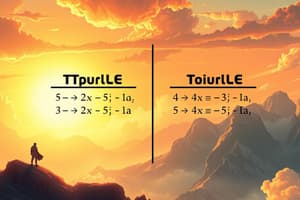Podcast
Questions and Answers
What is the definition of logically equivalent statements?
What is the definition of logically equivalent statements?
- Statements that are never true
- Statements that are always true
- Statements that have different truth values
- Statements that have the same truth value in all possible scenarios (correct)
What is the truth value of the material implication 'if p, then q' when p is true and q is false?
What is the truth value of the material implication 'if p, then q' when p is true and q is false?
- Either true or false
- False (correct)
- True
- Undefined
What is the rule that states if p → q and p are true, then q must be true?
What is the rule that states if p → q and p are true, then q must be true?
- Rule of Detachment (correct)
- De Morgan's Laws
- Rule of Syllogism
- Transitive Property
What is the property that states if p → q and q → r are true, then p → r is true?
What is the property that states if p → q and q → r are true, then p → r is true?
What is the logical equivalence of ¬(p ∧ q)?
What is the logical equivalence of ¬(p ∧ q)?
What is the logical equivalence of p ∧ (q ∨ r)?
What is the logical equivalence of p ∧ (q ∨ r)?
Flashcards are hidden until you start studying
Study Notes
Implication
Logical Equivalence
- Definition: Two statements are said to be logically equivalent if they always have the same truth value (i.e., both are true or both are false) in all possible scenarios.
Material Implication
- Definition: A material implication is a statement of the form "if p, then q" (p → q), which is false only when p is true and q is false.
- Truth Table:
- p | q | p → q
- --- | --- | -----
- T | T | T
- T | F | F
- F | T | T
- F | F | T
Logical Equivalence of Implications
- Rule of Detachment: If p → q and p are true, then q must be true.
- Rule of Syllogism: If p → q and q → r are true, then p → r is true.
- Transitive Property: If p → q and q → r are true, then p → r is true.
Logical Equivalence of Statements
- De Morgan's Laws:
- ¬(p ∧ q) ≡ ¬p ∨ ¬q
- ¬(p ∨ q) ≡ ¬p ∧ ¬q
- Distributive Property:
- p ∧ (q ∨ r) ≡ (p ∧ q) ∨ (p ∧ r)
- p ∨ (q ∧ r) ≡ (p ∨ q) ∧ (p ∨ r)
Studying That Suits You
Use AI to generate personalized quizzes and flashcards to suit your learning preferences.



